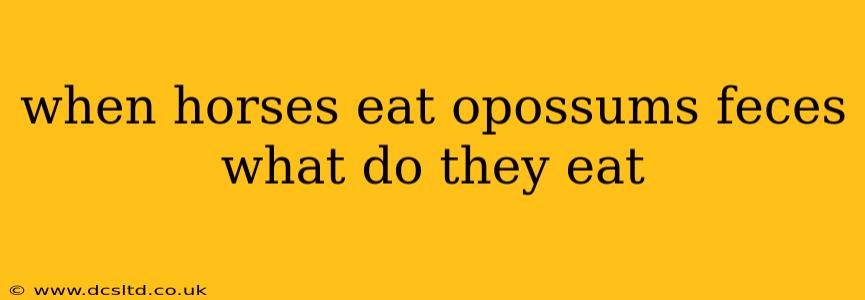When Horses Eat Opossum Feces: What's Really Going On?
The question "When horses eat opossum feces, what do they eat?" is a bit misleading. It implies that horses regularly consume opossum droppings, which is not the case. Horses are herbivores, meaning their diet consists primarily of plants. The consumption of feces, known as coprophagy, is unusual and often indicates a nutritional deficiency or underlying health problem. While it's theoretically possible for a horse to ingest opossum feces accidentally (e.g., through contaminated hay or pasture), it's not a normal part of their diet, and there's no specific nutritional benefit derived from it. What's important to understand is why a horse might engage in such behavior.
Why Would a Horse Eat Feces? (Including Opossum Feces)
Several factors can lead a horse to eat feces, including those of other animals:
-
Nutritional Deficiencies: A diet lacking essential nutrients, especially vitamins and minerals, can trigger coprophagy. Horses may try to compensate by consuming feces, hoping to obtain missing nutrients. This is more likely to involve their own feces, which still contain some undigested nutrients, rather than that of other animals.
-
Parasites: Internal parasites can disrupt the digestive process, leading to a horse not fully absorbing nutrients from their food. This can result in them seeking out additional sources of nutrition, including feces.
-
Stress and Boredom: Just like other animals, horses can exhibit behavioral issues due to stress or boredom. Coprophagy can be a manifestation of these underlying problems. A lack of adequate turnout, social interaction, or mental stimulation can contribute to this behavior.
-
Taste and Texture: While unlikely to be the primary driver, some horses might find certain types of feces palatable or interesting. This is less likely with opossum feces due to its likely composition and smell.
-
Accidental Ingestion: In scenarios where feces from various animals are mixed with hay or pasture, accidental ingestion is possible. This doesn't indicate a deliberate choice or nutritional need.
What are the Potential Risks of a Horse Eating Feces?
The biggest risk associated with a horse consuming feces, regardless of the source, is the potential for:
-
Parasite Transmission: Feces contain various parasites and their eggs. Ingesting feces greatly increases the risk of a horse becoming infected with intestinal parasites, leading to health problems.
-
Bacterial Infections: Feces can harbor harmful bacteria that can cause illness in horses.
-
Toxin Exposure: Depending on the animal's diet, feces might contain toxins that can be harmful to horses.
What Should You Do If You Notice Your Horse Eating Feces?
If you observe your horse engaging in coprophagy, it's crucial to consult a veterinarian. They can help determine the underlying cause, whether it's a nutritional deficiency, parasitic infestation, behavioral problem, or something else. A vet can conduct tests and recommend appropriate treatment or dietary adjustments. Ignoring the behavior could lead to severe health complications for your horse. They may also recommend strategies to address any stress or boredom issues contributing to the problem.
Is there a difference between a horse eating its own feces vs. another animal's feces?
Yes, there's a significant difference. Horses sometimes eat their own fresh droppings, a process called cecotrophy, to re-ingest beneficial bacteria and nutrients not fully absorbed the first time through their digestive system. This is a natural behavior, unlike the consumption of another animal's feces, which carries a higher risk of parasites and diseases. The consumption of opossum feces, specifically, is not a normal or healthy behavior for horses.
In conclusion, while a horse could theoretically ingest opossum feces, it's not a regular occurrence nor a beneficial behavior. If you observe your horse eating feces of any kind, it's a serious concern requiring veterinary attention to identify and address the root cause.
